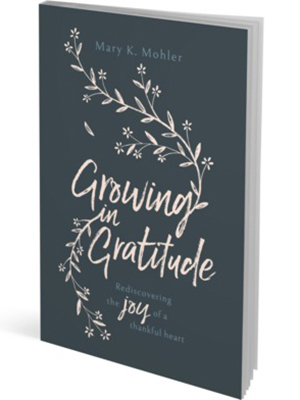Growing In Gratitude
Gratitude is more complex than a smile on one’s face or a polite, “thank you.” In Growing in Gratitude, Mary Mohler provides a rich theology revealing the deeper roots of gratitude. Many Christians experience a lull in their joy for the things of God years after conversion, and Mohler encourages them to discover anew the deep sense of gratefulness they first felt when they came to faith in Christ. Because in gratitude, God’s honor is at stake.
“Gratitude is a deep theological issue,” she writes. “I am not talking about a ‘count your many blessings, name them one by one’ kind of gratitude to God. I am talking about a deep sense of awe ingrained in our minds. I am talking about an awareness, in every waking moment, of the glorious truth that the God of the universe is infinite in all his perfections. And he loves us.”
From showing the role gratitude played in the Garden of Eden to finding ultimate gratitude in salvation, Mohler uses numerous biblical texts to explain the depth of gratitude Christians should display. Colossians 2 encourages believers to endure in their faith while “abounding in thanksgiving,” which Mohler observes is a continuous overflowing of praise for God’s great work in the lives of his children. Psalm 100 describes the people of God as the “sheep of his pasture” — they belong to the Lord and they are cared for by his gracious provision for them. This necessarily leads to entering “his gates with thanksgiving and his courts with praise,” Mohler writes.
But when human beings fail to thank God, disaster strikes. The Fall narrative in Genesis 3 pictures two sinless human beings, Adam and Eve, craving more than what God had already graciously provided, leading to ungodly independence and a tragic break of their relationship with their Lord. Similarly, Paul includes the failure to “honor [God] as God or give thanks to him” as one of a long list of reasons God’s wrath is poured out on humanity in Romans 1.
 Mohler also explains that gratitude begins in the heart and works outward into actions. The book is filled with practical advice and explains what it looks like to live a life defined by gratitude. Using various historical and popular Christian figures, she provides tangible examples on how gratitude is lived out in a daily walk with God.
Mohler also explains that gratitude begins in the heart and works outward into actions. The book is filled with practical advice and explains what it looks like to live a life defined by gratitude. Using various historical and popular Christian figures, she provides tangible examples on how gratitude is lived out in a daily walk with God.
“Let’s cultivate the art of writing a note to someone in order to show gratitude and encouragement,” Mohler writes. “If the Lord brings specific people to mind for no apparent reason, a short note written to simply say you thought of them and are thankful for what they mean to you could be used by the Lord in ways we vastly underestimate.”
Gratitude affects multiple facets of the Christian walk including times of both blessing and trials. Distinct to this book, Mohler challenges readers to express gratitude to God for not only for blessings, but also for the “thorns” and difficult trials he allows Christians to face.
Christians can not only thank God for his gifts (a “natural gratitude,” according to Mohler) and thank God for who he is (a “gracious gratitude”), but they can thank him for providing for them in the midst of difficult circumstances. Mohler recommends not only keeping a “blessing journal” — a collection of things God has done for us — but also remembering how the Lord has provided for them during trials. Those trying circumstances can be the means God uses to remind Christians of their care for him.
“No one wishes for a fire — and no one asks for a thorn,” she writes. “But as believers who all have suffering of some kind, as Scripture says we will, we certainly take joy in knowing the Lord is true to his word. We cherish the closeness we feel to our Lord as we bear adversity. He truly is with us on the mountain tops and in the valleys. He is faithful!”
Filled with practical examples of how to live lives of gratitude, this book is an excellent resource to help a Christian develop strategies for gratitude-filled living.




